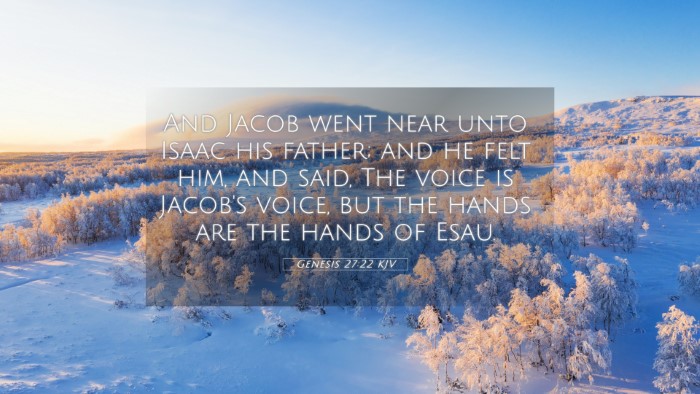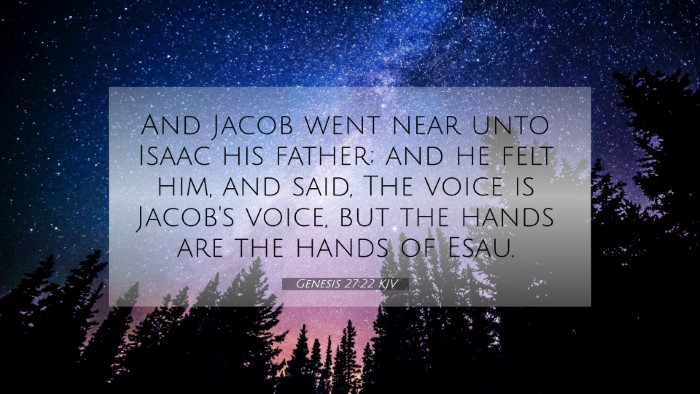Understanding Genesis 27:22
Genesis 27:22 reads: "So Jacob went near to Isaac his father, and he felt him and said, 'The voice is Jacob's voice, but the hands are the hands of Esau.'" This pivotal moment in the narrative is laden with theological and moral implications, revealing themes of deception, identity, and divine prophecy.
Summary of the Verse
This verse describes the moment when Jacob, disguised as his brother Esau, approaches their blind father Isaac to receive the blessing that was intended for Esau. Isaac, however, is initially confused by Jacob's voice, suggesting an internal struggle between appearance and reality. The intended blessing illustrates the complexity of family dynamics and God's sovereignty over human decisions.
Thematic Analysis
- The Deception of Jacob: Jacob's actions fulfill the prophecy given to Rebekah that the older would serve the younger (Genesis 25:23). Matthew Henry emphasizes that God's purposes are often realized through human flaws.
- Blindness of Isaac: Isaac's physical blindness parallels a spiritual blindness, where he fails to discern the true identity of his son. Adam Clarke notes that Isaac's love for Esau may have clouded his judgment.
- Identity and Voice: The distinction between Jacob's voice and Esau's hands symbolizes the conflict between one's true identity and the roles imposed by familial expectations. Albert Barnes highlights how this reflects broader existential questions about selfhood.
Cross-References: Connecting Biblical Texts
This verse connects to several other scripture passages that offer greater insight into its themes:
- Genesis 25:23: The prophecy about Jacob and Esau's futures sets the stage for the events that lead to Genesis 27:22.
- Genesis 27:1-4: Isaac's intention to bless Esau shows the familial favoritism that contributes to the conflict.
- Genesis 27:32-35: Isaac's eventual realization of the deception highlights the consequences of Jacob's actions.
- Romans 9:10-13: Paul references the chosen status of Jacob over Esau, furthering the discussion of divine election and human agency.
- Hebrews 12:16-17: The narrative warns of Esau's ungodliness and his subsequent loss of the blessing, illustrating the long-term effects of choices.
- Galatians 6:7: The principle of reaping what one sows can be seen in Jacob's eventual experiences of deception in his own life.
- Revelation 2:17: The theme of identity is echoed in the promises to those who overcome, signifying a transformation and true recognition by God.
Interpretation and Reflection
The interaction between Jacob and Isaac raises profound questions about deceit and authenticity. Jacob's disguise serves as a poignant reflection of humanity's tendency to manipulate perceptions to achieve desired outcomes. Yet, God's plans ultimately transcend human flaws, asserting His sovereignty in and through our actions.
Comparative Bible Verse Analysis
By analyzing Genesis 27:22 alongside other scriptural accounts, we can deepen our understanding of its implications:
- 1 Samuel 16:7: "For the Lord sees not as man sees: man looks on the outward appearance, but the Lord looks on the heart." This highlights the difference between God's discernment and human perception.
- Matthew 5:8: "Blessed are the pure in heart, for they shall see God." This invites reflection on purity and authenticity in our interactions.
- John 10:27: "My sheep hear my voice, and I know them, and they follow me." This reinforces the importance of recognizing the voice of truth amidst deception.
Tools for Bible Cross-Referencing
For deeper study, consider using tools for Bible cross-referencing. These resources can assist in identifying connections between Bible verses:
- Bible Concordances: These can help locate verses based on keywords and themes.
- Bible Cross-Reference Guides: Utilize guides that compile related passages for thematic studies.
- Cross-Reference Bible Study: Engage in group studies that explore interconnected themes and verses.
- Comprehensive Bible Cross-Reference Materials: These can provide extensive cross-references throughout various translations of the Bible.
Conclusion
Genesis 27:22 serves not only as a narrative about family conflict but also as a profound examination of identity, truth, and divine purpose. By exploring related scriptures and utilizing cross-referencing tools, one can gain richer insights into this verse and its broader implications within the biblical narrative.
Final Thoughts
Understanding Genesis 27:22 requires a multifaceted approach that considers historical context, literary structure, and theological significance. The cross-references and thematic connections deepen our appreciation for the intricate web of relationships and divine truths encapsulated within scripture.


